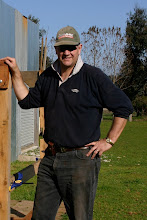I've always found it amusing that, in many countries, being a farmer is thought of as pretty low status - particularly if one is a small farmer - or peasant. This is not the way farmers were thought of in New Zealand or Australia when I was growing up. Having internalised that way of looking at the world, I could never really see the growing of food as anything but an honorable and important calling.
So it's refreshing to discover an organisation called La Via Campisena which sub-titles itself the International Peasant Movement. They're big on food sovereignty and very negative on the WTO, World Bank, IMF et al.
However, I'm not sure we get to quite similar positions on the same basis. I think I get there more like Joseph Stiglitz - who said it well in Globalisation and Its Discontents:
Behind the free market ideology there is a model, often attributed to Adam Smith, which argues that market forces--the profit motive--drive the economy to efficient outcomes as if by an invisible hand. One of the great achievements of modern economics is to show the sense in which, and the conditions under which, Smith's conclusion is correct. It turns out that these conditions are highly restrictive. Indeed, more recent advances in economic theory --ironically occurring precisely during the period of the most relentless pursuit of the Washington Consensus policies--have shown that whenever information is imperfect and markets incomplete, which is to say always, and especially in developing countries, then the invisible hand works most imperfectly. Significantly, there are desirable government interventions which, in principle, can improve upon the efficiency of the market. These restrictions on the conditions under which markets result in efficiency are important--many of the key activities of government can be understood as responses to the resulting market failures.
Like Stiglitz, I see the failure of the World Bank, IMF and WTO as deriving not from evil conspiracy, but from a series of intellectual errors and a bureaucratic failure of the imagination. What ever they intend, they end up serving the interests of first world corporations (particularly the finance sector) against any sensible conception of the public interest. And these corporations (mainly) follow the rules - except the rules are dumb - particularly in systematically favouring scale - and then in allowing scale to distort markets.
In the late 90s and early this decade I watched Australian regulators completely muck up the implementation of independent economic regulation of the electricity and gas sectors. There were a couple of sensible, pragmatic characters (in NSW and SA), but the rest were hopeless. They cloaked themselves in the public interest and ended up doing the devil's business - because they didn't have much idea about how the real world actually works.
But when things go wrong (and plenty of things are wrong with the world), it's almost always because the we have screwed up. The implication of this is that it is only we who can actually change anything - not they or them - just we.
These things I believe !
So I've decided the practical, rational response to all the problems of the food system is ...... for me to be a peasant. Not long now .....




No comments:
Post a Comment